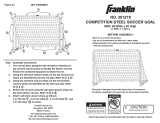-2- G4008/G4009 Drill Press
WARNING: For Your Own Safety Read
Instruction Manual Before Operating Drill Press
Safety Instructions For Power Tools
These safety rules cannot cover every situation in a work shop. Consider your conditions when setting up
or operating your drill press
SECTION 1: SAFETY
a) Always wear eye protection.
b) Do not wear gloves, necktie or loose cloth-
ing.
c) Clamp workpiece or brace against the col-
umn to prevent rotation.
d) Use recommended speed for drill accesso-
ry and workpiece material.
9. USE PROPER EXTENSION CORD. Make
sure your extension cord is in good condi-
tion. When using an extension cord, be sure
it is rated Hard Service (grade S) or better.
Conductor size must be 16 A.W.G. for cords
up to 100 feet in length. An undersized cord
will cause a drop in line voltage resulting in
loss of power and overheating. Your exten-
sion cord must also contain a ground wire
and plug pin. Always repair or replace
extension cords if they become damaged.
Minimum Gage for extension cord:
16 A.W.G. 50ft
16 A.W.G. 100ft
14 A.W.G. 200ft
12 A.W.G. 300ft
10. WEAR PROPER APPAREL Do not wear
loose clothing, gloves, neckties, rings,
bracelets, or other jewelry which may get
caught in moving parts. Non-slip footwear is
recommended. Wear protective hair covering
to contain long hair.
11. ALWAYS USE SAFETY GLASSES. Also
use face or dust mask if cutting operation is
dusty. Everyday eyeglasses only have
impact resistant lenses, they are NOT safety
glasses.
1. KEEP GUARDS IN PLACE and in working
order.
2. REMOVE ADJUSTING KEYS AND
WRENCHES. Form habit of checking to see
that keys and adjusting wrenches are
removed from tool before turning on.
3. KEEP WORK AREA CLEAN. Cluttered
areas and benches invite accidents.
4. DON’T USE IN DANGEROUS ENVIRON-
MENT. Don’t use power tools in damp or
wet locations, or expose them to rain. Keep
work area well lighted.
5. KEEP CHILDREN AWAY. All visitors
should be kept a safe distance from work
area.
6. MAKE WORK SHOP KID PROOF with
padlocks, master switches, or by removing
starter keys.
7. DON’T FORCE TOOL. It will do the job bet-
ter and safer at the rate for which it was
designed.
8. USE RIGHT TOOL. Don’t force tool or
attachment to do a job for which it was not
designed.






















